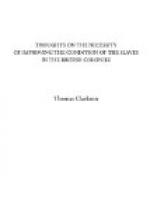Steele); for how could an exact account kept there,
have occasioned an increase in the produce of the
earth? but, as Mr. Steele himself says,
to the
establishment of his copyholders, or to the
alteration
of the condition of his slaves. His slaves
did not only three times more work than before, in
consequence of the superior industry he had excited
among them, but, by so doing, they were enabled to
put the corn into the earth three times more quickly
than before, or they were so much forwarder in their
other work, that they were enabled to sow it at the
critical moment, or so as
to save the season,
and thus secure a full crop, or a larger crop on a
less number of acres, than was before raised upon
a greater. The copyholders, therefore, were the
persons who increased the produce of the earth; but
the exact account kept at the store prevented the
produce from being misapplied as formerly. It
could no longer be put down in the general expression
of “given in allowances to the Negroes and the
stock;” but it was put down to the copyholder,
and to him only, who received it. Thus Mr. Steele
saved the purchase of a great part of the provisions
for his slaves. He had formerly a great deal
to buy for them, but now nothing. On the other
hand, he had to sell; but, as his slaves were made,
according to the new system, to
maintain themselves,
he had now
the whole produce of his estate to
dispose of. The circumstance therefore
of having nothing to buy, but every thing to sell,
constituted another source of his profits.
What the other particular profits of Mr. Steele were
I can no where find, neither can I find what were
his particular expenses; so as to be enabled to strike
the balance in his favour. Happily, however, Mr.
Steele has done this for us himself, though he has
not furnished us with the items on either side.—He
says that “from the year 1773 to 1779 (he arrived
in Barbadoes in 1780), his stock had been so much reduced
by ill management and wasteful economy, that the annual
average neat clearance was little more than one
and a quarter per cent. on the purchase. In
a second period of four years, in consequence of the
exertion of an honest and able manager, (though with
a further reduction of the stock, and including the
loss from the great hurricane,) the annual average
income was brought to clear a little above two
per cent.; but in a third period of three years from
1784 to 1786 inclusive, since the new mode of governing
the Negroes, (besides increasing the stock, and
laying out large sums annually in adding necessary
works, and in repairs of the damages by the great
hurricane,) the estate has cleared very nearly four
and a quarter per cent.; that is, its annual average
clearance in each of these three periods, was in this
proportion; for every 100 l. annually cleared in the
first period the annual average clearance in the second
period was 158 l. 10s., and in the third period was




